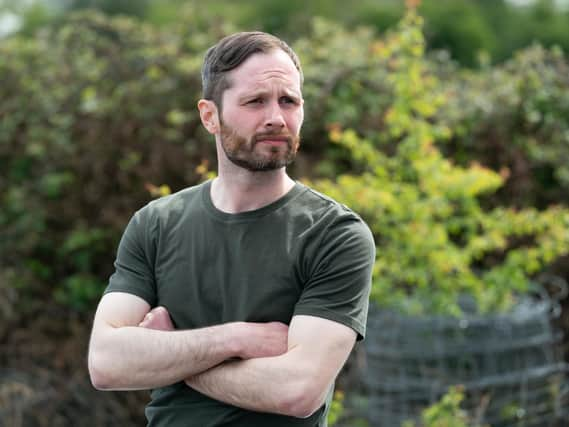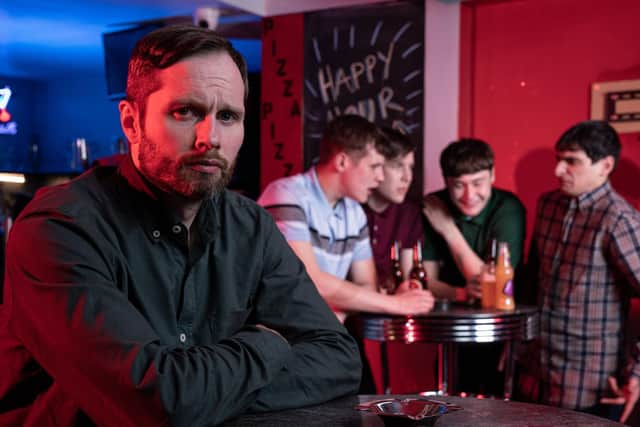Ladhood creator Liam Williams on growing up in Garforth and how it shaped his TV comedy show


The ground-breaking Channel 4 series Skins blended comedy and drama and its depiction of youthful hedonism was both funny and outrageous. Since then we’ve had the likes of The Inbetweeners, Derry Girls and Ladhood.
The latter, which is back on BBC Three with a second series, is the brainchild of comedian, writer and actor Liam Williams. It’s a fictional coming-of-age comedy that follows a group of teenage lads as they attempt to navigate their way through dating, driving and dive-bars while growing up on the mean streets of suburban Leeds.
Advertisement
Hide AdAdvertisement
Hide AdThe TV show is an adaptation of another series he did for BBC Radio 4, which was a storytelling show about his own teenage years growing up in Garforth, near Leeds.


“It was a comedy series mixed with some slightly more poetic, memoir-style bits,” says Williams of the radio show. “I remember talking to the commissioner about it and he asked me what the reference points for it were, and I remember saying something like ‘The Inbetweeners meets Shane Meadows meets Laurie Lee and Cider With Rosie.’”
The first series of Ladhood proved popular with both critics and viewers. It uses a dual timeline to great effect, with Williams’ fictional character looking back at his noughties adolescence in search of answers to his modern-day millennial angst.
“The essence of the stories is what me and the producer have been calling ‘truthfulness, if not factfulness’ and hopefully other people can relate to them regardless of how old they are or where they grew up.”
Advertisement
Hide AdAdvertisement
Hide AdWilliams enjoyed watching comedy when he was growing up but it wasn’t something he thought about as a career option. “My parents watched a lot of sitcoms and then in my early teens I found Monty Python and I’d read Private Eye, but I certainly wasn’t writing any comedy at that age. I liked listening to rap music so for a while I thought I might be a rapper or something, which was very misguided.”
Like many youngsters growing up in suburbia, Williams found it all a bit dull. “Mike Skinner (of The Streets) described where he grew up and he put it quite well. He called it ‘Barratt class’ as in a Barratt housing estate, of which there were quite a few in Garforth. He said we weren’t poor exactly but there wasn’t much money about either. It was just pretty boring. It feels unfair to deride Garforth as being boring because it’s what you make it.”
He describes his hometown as a “no nonsense” kind of place. “It was a town that was quite loud, where people like to shout and get their opinion across, and crack a joke. And I guess Yorkshire’s quite like that in general,” he says. “You never really understand how a place has shaped you until you move away and look back on it, which is a big part of Ladhood.”
Williams did well at school and went on to study English at Cambridge University, though he admits he felt like an outsider to begin with. “As soon as I turned up there I felt a little bit like a fish out of water, as I’m sure lots of people do. There weren’t that many broad Northern accents which I had at the time and I did find my accent changing very quickly.”
Advertisement
Hide AdAdvertisement
Hide AdHe says he turned up at university not knowing what he wanted to do. “I was given an email account by the university. I’d never had an email account before so I signed up to every single club and was getting emails for weeks from groups like the juggling society and the learn Arabic society.”
He did eventually join the fabled Cambridge Footlights. “I did a bit of acting but there were a lot of good actors there so I didn’t really stand out. But eventually some friends and I plucked up the courage to take a sketch to Footlights and it went down really well, and I couldn’t believe it. It was one of the first times in my life where I thought ‘I might be quite good at this.’ And that’s where it began.”
After graduating, he pursued a career in writing and comedy. His YouTuber satire Pls Like was nominated for a Bafta, while he earned two Edinburgh comedy award nominations for his stand-up early on.
However, he found himself conflicted about being a stand-up. “You become locked in a persona and my persona was a pessimistic one, because that was probably reflective of who I was in my early to mid-20s. But suddenly it didn’t really suit me any more and I didn’t know how to put myself across on stage. So I took some time away from it,” he says.
Advertisement
Hide AdAdvertisement
Hide Ad“I like stand-up but what is more appealing about TV is it’s so collaborative. Stand-up isn’t always a bear pit but you never quite know what’s going to happen, whereas with TV you’re creatively experimenting and working things out with other people and you feel less alone and you have more time to make your mistakes and correct them, and possibly that suits me better.
“It’s a rare privilege to be able to make a TV show, especially one in your own voice and from your own perspective.”
With Ladhood, he has tapped into so-called “lad culture” which first came to prominence in the 90s with the rise of magazines like FHM and Loaded, along with the Britpop scene dominated by the likes of Oasis and Blur.
Williams is interested in the word “lad” itself and the connotations it carries. “Growing up in Leeds we’d call each other ‘lad’ and it’s quite affectionate. And that felt like something distinct and then when I was at university there was a kind of rugby and public school lad identity that felt like something different altogether.
Advertisement
Hide AdAdvertisement
Hide Ad“There was also a new mainstream feminism that was quite conscious of lad culture, so that range of meanings of the word and different constructions of a youthful male identity that had some moral shortcomings, but virtues in other ways, was something I wanted to try and make sense of.”
He feels the modern sense of the word has changed again. “It’s maybe a slightly less toxic version of lads identity that’s not even gender specific, which is just about being youthful and spirited but is not incompatible with being a passionate, conscientious person at the same time.
“So who knows, maybe we’re about to witness a new era of ladism that’s a bit more inspiring.”
The second series of Ladhood is available on BBC iPlayer as a six-episode boxset.
Comment Guidelines
National World encourages reader discussion on our stories. User feedback, insights and back-and-forth exchanges add a rich layer of context to reporting. Please review our Community Guidelines before commenting.